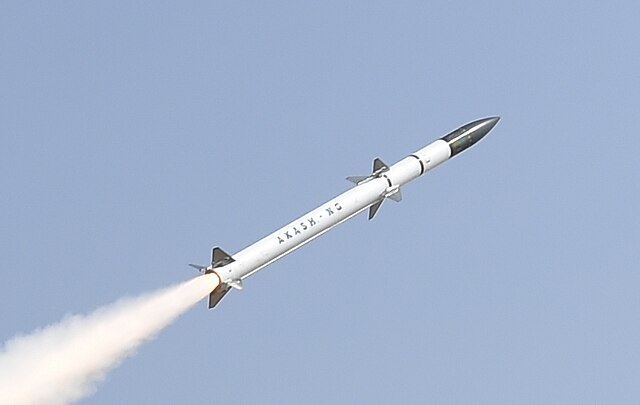Morocco’s potential acquisition of the Akash-NG
NEWS
3/29/20255 min read


Introduction
Morocco’s potential acquisition of the Akash-NG system highlights its efforts to strengthen air defenses with advanced technology. This move comes amid warming defense relations with India, offering both strategic and economic benefits.
Background on Akash-NG
The Akash-NG is an upgraded version of India’s Akash missile, designed for greater deployability with a canisterized launcher and reduced footprint. It can engage targets up to 30- 60 km away and at altitudes up to 14 km, making it effective against modern aerial threats like drones and cruise missiles. Successful flight tests, including one in January 2024 off Odisha’s coast, have validated its capabilities (Akash-NG DRDO).
India-Morocco Defense Ties
Recent developments, such as a December 2024 defense seminar in Rabat, show Morocco welcoming Indian defense firms, suggesting a favorable environment for this deal. India’s offer of technology transfer could help Morocco enhance its local defense production, aligning with its diversification strategy (Morocco-India Defense).
Regional Context and Possibilities
India has exported defense systems like Akash to Armenia and possibly Sudan, with interest from Middle Eastern countries like UAE. While direct sales to North Africa are less documented, Morocco’s existing acquisitions from France and China indicate a pattern of seeking varied suppliers, potentially opening doors for Akash-NG.
Morocco’s Potential Acquisition of Akash-NG and Its Implications
Overview and Context
Recent reports indicate that Morocco is exploring the acquisition of India’s Akash-NG air defense system, a significant step in enhancing its military capabilities. This consideration aligns with Morocco’s strategy to diversify its defense suppliers and strengthen its air defense against modern aerial threats. The Akash-NG, developed by the Defence Research and Development Organisation (DRDO), is an advanced surface-to-air missile system designed for the Indian Air Force, with production handled by Bharat Dynamics Limited (BDL) and Bharat Electronics Limited (BEL). This potential deal also reflects the growing defense ties between India and Morocco, underscored by recent diplomatic and industrial engagements.
Details of the Akash-NG System
The Akash-NG, or Akash New Generation, is a successor to the original Akash and Akash-1S systems, approved for development in September 2016 with funding of ₹470 crore. It features several improvements, including a canisterized launcher and a significantly reduced ground system footprint, enhancing deployability. Official tests have demonstrated its capabilities:
Range and Altitude: It can engage targets at a distance of approximately 30-60 km and reach altitudes up to 14 km.
Performance: Capable of intercepting high-speed, agile aerial threats, such as drones and cruise missiles, with a speed of up to Mach 2.5.
Recent Tests: A successful flight test on January 12, 2024, at the Integrated Test Range (ITR) off Odisha’s coast intercepted a high-speed unmanned aerial target at very low altitude. The test validated the missile’s indigenously developed Radio Frequency (RF) Seeker, launcher, multi-function radar, and command, control, and communication system (Akash-NG DRDO).
The system’s development involved collaboration with private firms under the Development cum Production Partner programme, such as Electropneumatics and Hydraulics India, highlighting India’s push for indigenous manufacturing.
Morocco’s Interest and Strategic Implications
According to a recent article from Hespress, Morocco is considering the Akash-NG as part of its efforts to strengthen air defenses with various systems. A key attraction is India’s offer of technology transfer, which could enable local production in Morocco, boosting its defense industry. This aligns with Morocco’s broader strategy to diversify its defense suppliers, as evidenced by previous acquisitions such as the VL MICA from France (with a 20 km range and 9,000 m altitude) and the Sky Dragon from China.
The growing defense ties between India and Morocco were highlighted in a defense industry seminar held in Rabat on December 9-10, 2024, jointly organized by the defense ministries of both countries, the Indian Embassy in Morocco, and the Society of Indian Defence Manufacturers. Moroccan Minister Delegate for National Defense Abdeltif Loudyi stated, “We want you in Morocco; we will support you,” emphasizing the potential for collaboration (Morocco-India Defense). This seminar capitalized on India’s “Make in India” initiative, aiming to strengthen national production capacities while promoting international partnerships.
Historical and Regional Context
India and Morocco have enjoyed cordial relations since establishing diplomatic ties in 1957, with historical connections dating back to the 14th century through the travels of Ibn Battuta. In modern times, India supported Morocco’s decolonization and freedom movement at the United Nations. Recent developments, such as Morocco’s return to the African Union in 2017, have further strengthened bilateral ties, with defense emerging as a new area of cooperation.
India’s defense export strategy provides context for this potential sale. The Cabinet Committee on Security approved the export of the Akash system in December 2020, targeting $5 billion in defense exports by 2024. Notable exports include a deal with Armenia in 2022 worth ₹6,000 crore for Akash Weapon Systems and Ashwin Air Defence Systems, with deployment expected within 4-5 years. There are also speculations about exports to Sudan, following the display of Akash SAM at a Sudanese Military Exhibition in 2022 and mentions in the Indian Ministry of Defence’s 2023 list of exported items (Akash Exports). Interest has also been shown by ASEAN nations like Vietnam and the Philippines, as well as Middle Eastern countries like UAE, indicating a growing global market for Indian defense products.
For North Africa specifically, while direct sales of Akash systems are less documented, the region’s dynamics suggest possibilities. Sudan’s potential acquisition, given its proximity and shared African context, could influence Morocco’s decision. Additionally, Morocco’s existing defense relationships with France and China, as mentioned in the Hespress article, show a pattern of diversification that could extend to India.
Comparative Analysis and Possibilities
The Akash-NG’s advanced features, such as its extended range and technology transfer offer, position it as a competitive option compared to systems like the VL MICA or Sky Dragon. Its lower cost and high accuracy, attributed to solid-fuel technology and indigenous radars, could be appealing, especially given India’s reputation for cost-effective defense solutions. The system’s successful tests and operational readiness, as seen in the 2024 flight test, reduce risks for potential buyers like Morocco.
Previous sales to Armenia and possible interest from Sudan suggest that India’s defense exports are gaining traction, particularly in regions with strategic alignments. For Morocco, this deal could not only enhance its air defense but also foster deeper technological and industrial cooperation with India, potentially leading to joint ventures or further defense collaborations.
Economic and Geopolitical Considerations
Economically, the technology transfer aspect could help Morocco develop its defense manufacturing capabilities, reducing reliance on imports and creating jobs. Geopolitically, aligning with India, a rising power in defense exports, could strengthen Morocco’s position in Africa and Europe, especially given its role as a gateway for Indian defense exports to these regions, as noted in recent analyses (Morocco-India Partnership).
Conclusion
Morocco’s consideration of the Akash-NG system reflects its strategic vision to enhance air defenses with advanced, diversified technology. The deal’s success would depend on negotiations, but the combination of Akash-NG’s capabilities, India’s export track record, and the growing bilateral defense ties suggests a promising outlook. This potential acquisition could mark a new chapter in India-Morocco relations, with implications for regional security and defense industry development.
